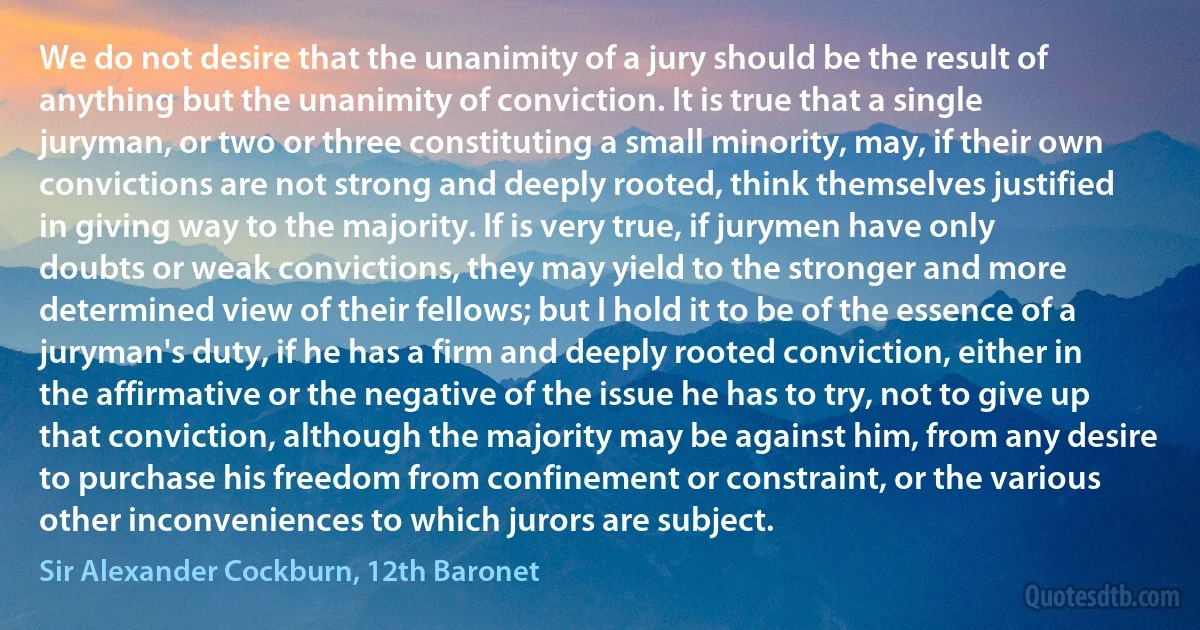
We do not desire that the unanimity of a jury should be the result of anything but the unanimity of conviction. It is true that a single juryman, or two or three constituting a small minority, may, if their own convictions are not strong and deeply rooted, think themselves justified in giving way to the majority. If is very true, if jurymen have only doubts or weak convictions, they may yield to the stronger and more determined view of their fellows; but I hold it to be of the essence of a juryman's duty, if he has a firm and deeply rooted conviction, either in the affirmative or the negative of the issue he has to try, not to give up that conviction, although the majority may be against him, from any desire to purchase his freedom from confinement or constraint, or the various other inconveniences to which jurors are subject.
Sir Alexander Cockburn, 12th BaronetRelated topics
affirmative anything confinement desire duty freedom giving hold result should single small think three try view way yieldRelated quotes
A Frenchman is self-assured because he regards himself personally both in mind and body as irresistibly attractive to men and women. An Englishman is self-assured as being a citizen of the best-organized state in the world and therefore, as an Englishman, always knows what he should do and knows that all he does as an Englishman is undoubtedly correct. An Italian is self-assured because he is excitable and easily forgets himself and other people. A Russian is self-assured just because he knows nothing and does not want to know anything, since he does not believe that anything can be known. The German's self-assurance is worst of all, stronger and more repulsive than any other, because he imagines that he knows the truth -- science -- which he himself has invented but which is for him the absolute truth.

Leo Tolstoy
Justice is the end of government. It is the end of civil society. It ever has been, and ever will be, pursued, until it be obtained, or until liberty be lost in the pursuit. In a society, under the forms of which the stronger faction can readily unite and oppress the weaker, anarchy may as truly be said to reign, as in a state of nature where the weaker individual is not secured against the violence of the stronger: And as in the latter state even the stronger individuals are prompted by the uncertainty of their condition, to submit to a government which may protect the weak, as well as themselves: so in the former state, will the more powerful factions be gradually induced by a like motive, to wish for a government which will protect all parties, the weaker as well as the more powerful.

Alexander Hamilton
WHAT HAPPENS AFTER DEATH?
When a human soul goes out of the body, some great mystery happens. For if it is guilty of sins, then there come hordes of demons, evil angels and dark forces, take that soul and drag it to their side.
No one should be surprised at that, because if a man surrendered and fell prey to them while still alive in this world, will not they have even greater control over him and enslave him when he departs from this world?
As for the other, the better part of people, something different happens to them. There are Angels around the holy servants of God in this life; the holy spirits surround them and protect them; and when their souls are separated from the body, the choir of Angels welcomes them into their fellowship, into a bright life, and thus leads them to the Lord.

Macarius of Egypt
A digital computer can usually be regarded as consisting of three parts: (i) Store. (ii) Executive unit. (iii) Control. ...The executive unit is the part which carries out the various individual operations involved in a calculation. ...It is the duty of the control to see that...[the table of] instructions are obeyed correctly and in the right order. ...A typical instruction might say-"Add the number stored in position 6809 to that in 4302 and put the result back into the latter storage position." Needless to say it would not occur in the machine expressed in English. It would more likely be coded in a form such as 6809430217. Here 17 says which of various possible operations [add] is to be performed on the two numbers. ...It will be noticed that the instruction takes up 10 digits and so forms one packet of information...

Alan Turing
The economic betterment of a nation which is at a low level of intelligence and culture, or in which the population is small in relation to the extent and productivity of its territory, is best accomplished through free trade with highly cultivated, rich, and industrious nations. In the case of such a country every restriction of trade, intended to plant manufacturing industry within its borders, is premature and injurious, not only to the welfare of mankind in general, but to the progress of the nation itself. Only when the intellectual, political, and economic education of the nation has so far advanced as a result of free trade that its further progress would be checked and hindered by the import of foreign manufactures and the lack of a sufficient market for its own goods, can protective measures be justified.

Friedrich List
